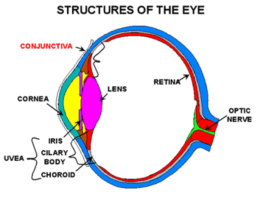Allergic Conjunctivitis Defined

Allergic conjunctivitis (eye allergy) is the most common allergy affecting the eyes.
Many people with allergies get allergic conjunctivitis when their eyes come in contact with an allergen. The allergen triggers the release of histamine. This typically results in itching, redness, burning or tearing of the conjunctivae. These are the thin membranes lining the eyelids and the exposed surface of the eyes.
Allergic conjunctivitis can be seasonal or perennial. The seasonal version is much more common. It is related to exposure to airborne allergens such as grass, tree and weed pollen or molds. The perennial form persists throughout the year and is usually triggered by dust mites, animal dander or molds.
Irritants such as cigarette smoke, strong odors or fumes are not necessarily allergens, but they can make symptoms worse.
Learn more about allergic conjunctivitis symptoms, diagnosis, treatment and management.
If your symptoms are making you miserable, an allergist / immunologist, often referred to as an allergist, can help. An allergist has advanced training and experience to determine what is causing your symptoms and develop a treatment plan to help you feel better and live better.
The AAAAI's Find an Allergist / Immunologist service is a trusted resource to help you find a specialist close to home.